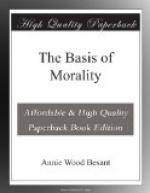To those whose intelligence and conscience had revolted against the crude and immoral maxims mixed up with noble precepts in Revelation; to those who recognised the impossibility of accepting the varying voices of Intuition as a moral guide; to all those the theory that Morality was based on Utility, came as a welcome and rational relief. It promised a scientific certitude to moral precepts; it left the intellect free to inquire and to challenge; it threw man back on grounds which were found in this world alone, and could be tested by reason and experience; it derived no authority from antiquity, no sanction from religion; it stood entirely on its own feet, independently of the many conflicting elements which were found in the religions of the past and present.
The basis for morality, according to Utility, is the greatest happiness of the greatest number; that which conduces to the greatest happiness of the greatest number is Right; that which does not is Wrong.
This general maxim being laid down, it remains for the student to study history, to analyse experience, and by a close and careful investigation into human nature and human relations to elaborate a moral code which would bring about general happiness and well-being. This, so far, has not been done. Utility has been a “hand-to-mouth” moral basis, and certain rough rules of conduct have grown up by experience and the necessities of life, without any definite investigation into, or codifying of, experience. Man’s moral basis as a rule is a compound of partially accepted revelations and partially admitted consciences, with a practical application of the principle of “that which works best”. The majority are not philosophers, and care little for a logical basis. They are unconscious empirics, and their morality is empirical.
Mr. Charles Bradlaugh, considering that the maxim did not sufficiently guard the interests of the minority, and that, so far as was possible, these also should be considered and guarded, added another phrase; his basis ran: “The greatest happiness of the greatest number, with the least injury to any.” The rule was certainly improved by the addition, but it did not remove many of the objections raised.
It was urged by the Utilitarian that morality had developed out of the social side of human beings; that men, as social animals, desired to live in permanent relations with each other, and that this resulted in the formation of families; men could not be happy in solitude; the persistence of these groups, amid the conflicting interests of the individuals who composed them, could only be secured by recognising that the interests of the majority must prevail, and form the rule of conduct for the whole family. Morality, it was pointed out, thus began in family relations, and conduct which disrupted the family was wrong, while that which strengthened and consolidated it was right. Thus family morality was established. As families




